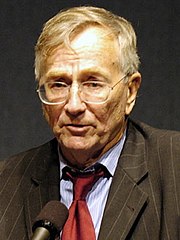Seymour Hersh
| Seymour Hersh | |
|---|---|

Hersh in 2004
|
|
| Born |
Seymour Myron Hersh April 8, 1937 Chicago, Illinois, United States |
| Other names | Sy |
| Alma mater | University of Chicago |
| Occupation | Journalist, writer |
| Spouse(s) | Elizabeth Sarah Klein (m. 1958) |
| Awards |
Polk Award (1969, 1973, 1974, 1981, 2004) Pulitzer Prize (1970) George Orwell Award (2004) |
Seymour Myron "Sy" Hersh (born April 8, 1937) is an American investigative journalist and political writer based in Washington, D.C. He is a longtime contributor to The New Yorker magazine on national security matters and has also written for the London Review of Books since 2013.
Hersh first gained recognition in 1969 for exposing the My Lai Massacre and its cover-up during the Vietnam War, for which he received the 1970 Pulitzer Prize for International Reporting. In 2004, he notably reported on the US military's mistreatment of detainees at Abu Ghraib prison. He has also won two National Magazine Awards and five George Polk Awards. In 2004, he received the George Orwell Award.
Hersh was born on April 8, 1937 in Chicago to Yiddish-speaking Lithuanian Jewish parents who emigrated to the US from Lithuania and Poland and ran a dry-cleaning shop in Chicago's Austin neighborhood. After graduating from the University of Chicago with a history degree, Hersh found himself struggling to find a job. He began working at Walgreens before being accepted into University of Chicago Law School but was soon expelled for poor grades. After returning for a short time to Walgreens, Hersh began his career in journalism as a police reporter for the City News Bureau in 1959. He later became a correspondent for United Press International in South Dakota. In 1963, he went on to become a Chicago and Washington correspondent for the Associated Press. While working in Washington Hersh first met and befriended I. F. Stone, whose I. F. Stone's Weekly would serve as an initial inspiration for Hersh's later work. It was during this time that Hersh began to form his investigative style, often walking out of regimented press briefings at the Pentagon and seeking out one-on-one interviews with high-ranking officers. After a falling out with the editors at the AP when they insisted on watering down a story about the US government's work on biological and chemical weapons, Hersh left the AP and sold his story to The New Republic. During the 1968 presidential election, he served as press secretary for the campaign of Senator Eugene McCarthy.
...
Wikipedia
